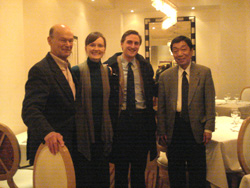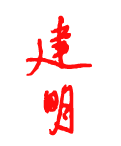The Gentlest Man
Matthew WhiteFrom the day that I met Dr. Hsu he was a deeply affectionate mentor. I had the privilege to be the last student admitted to PBU’s Honors Program under the leadership of Dr. Hsu. This was a privilege because Dr. Hsu claimed that as his last student he would take special care of me. And rather than mentor me quietly and modestly, Dr. Hsu employed an endless faculty for drama and amplification. He told everyone that I was his ‘Benjamin’. He told me that I had the ‘Midas touch’. He was incorrigible in his tendency to magnify and embellish. (I should add that all the students he mentored, which was quite a few, he treated this way.)
I first met him in my interview for PBU’s Honors Program. I had quoted Stéphane Mallarmé in my application essay because I thought it had a cute similarity to the verse from Ecclesiastes that was to be the starting point of the essay. Ecclesiastes 12:12:
Mallarmé wrote: The flesh is sad, alas! and all the books are read.
Dr. Hsu asked me where the poem came from - it is easy enough to find a cute quote like that. I, frankly, could not remember exactly, because I did insert the quote just because it looked handsome on the paper. I did my best to remember. “The Sea Bird?” I responded.
Dr. Hsu was so gregarious and optimistic that he did not need the right answer to find an excuse to encourage a young student.
“The Sea-Breeze, you got it! See, he doesn’t just find quotes and put them on his papers without knowing the source. He’s got real potential!” As groundless as his encouragement sometimes was, it was important to any who received it. It was exciting and inspiring to hear a great man tell you that you were capable of great things.
My first year at PBU I experienced the painful end of a (rather silly) high school romance. I saw a lot of Dr. Hsu that semester. He saw me in the hall once, after the semester started, and invited me to his office. “Come up and we can read Mallarmé in the French!” I was not a music major at all, and had hardly touched a piano, but Dr. Hsu invited me into his studio all the same. When he saw that I was struggling through a breakup he didn’t ignore it and redirect me. He gave me poetry. He taught me to say Pushkin’s “I loved you once” in the Russian. “All Russian children are taught this poem,” he said. “They do not understand it when they learn it, but they are taught this poem so that they have something to rely on when their hearts are broken later in life.” That semester he played Rachmaninoff’s Second Piano Concerto with PBU’s orchestra and it moved me so much that I followed him into becoming a music major, a difficult step for someone with almost no training, and graduated with a B.Mus. in 2010.
I remember countless lunches and dinners with Dr. Hsu, on campus and off, alone and with others. We talked about the poetry of Gerard Manley Hopkins, the de facto poet laureate of the Honors Program. We talked about the ‘physicality’ of Hopkins’ faith and that it was a reflection of his Catholicism. He said something to the effect that he felt more affinity for the Catholics on this point than he often would let on. Dr. Hsu was present with us in a very physical sense. He brought an unexpected corporeal power to his scholarship, his musicianship, and his relationships, but he was at the same time the gentlest man I’ve ever known.

From right to left: Sam with Matt and his wife Meghan, and Jonathan Steinberg, a professor of European history at The University of Pennsylvania

